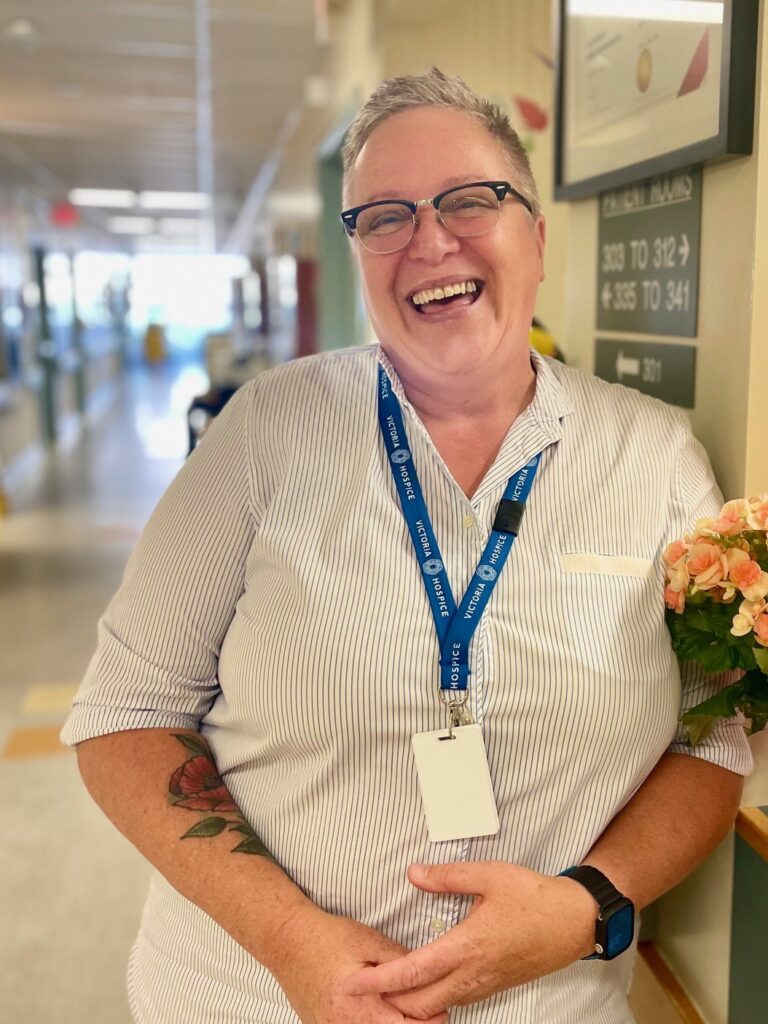Teri Henderson was appointed Interim Chief Executive Officer effective in May, 2023 after joining Victoria Hospice as Chief Operating Officer in March. A long-time advocate for accessible and equitable community-based palliative care, Teri’s previous roles includes Director of Clinical Services at Hospice Toronto and Associate Director of Community Development for Gilda’s Club of Greater Toronto, a charity that supports people living with cancer. She has been a program lead and instructor in Mindfulness Informed End-of-life Care at the University of Toronto’s School of Continuing Studies and holds a Master of Social Work from the University of Toronto.
What brought you to hospice work?
In 1998, I was at a dinner party when I received a call that my mother had fallen when walking in the snow. She couldn’t get up, because as it turned out, she had two previously undiagnosed brain tumors. She went from being someone who we thought was a healthy person, to dying in the course of four months. After she spent some time in hospital, I was able to place her in hospice near my home in Toronto. Her experience, and mine, changed drastically after that. Her care was instantly aligned with the fact that she was dying. It altered the trajectory of my career as a social worker and how I wanted to be in the world. It changed me as a person. From that moment on, I have focused on working with people who are living with significant illness and dying.
What makes hospice special?

The time people who are dying and their loved ones can spend together is so important. It’s not about surgery or treatment, or poking and prodding. It’s about peaceful days, comfort, and support to be as pain-free as possible. Once in hospice, my mom wasn’t distressed by the kinds of interference that can come with a hospital admission. The environment gave us space to talk through her hopes and fears, and it enabled me to help her when she was really afraid.
One of the important ways in which hospice is different than other care is the dedicated psychosocial support provided to families and the person who is dying. This support is one of the pillars of care that we are committed to providing at Victoria Hospice.
How is hospice important for family and friends?
We hear over and over again from families that the care team’s ability to take time with someone and help them process what’s happening is so important and appreciated. The care team knows how to slip in and out of the family experience, allowing them to be exactly how they need to be in that moment.
Because of the nature of hospice care, we can stop and simply be with people, and that makes all the difference. Whether a staff member or a volunteer, our job is to stop and hear you, and simply be available. That doesn’t happen everywhere. This kind of caring attention is important not only to loved ones, but to people who are dying who do not have a family or close friends.
We recognize that the experience of family caregivers can be complicated by difficult relationships, and not everyone who receives hospice support has experienced positive and loving relationships. Our care team brings a trauma-informed approach to their work and don’t make assumptions about the nature of people’s relationships.
What does the “circle of care” mean?
Another good part of hospice care is the impact on everyone who surrounds the person in the bed. We don’t care only for the person who is dying. We support everyone who comes to be a part of that person’s dying, whether they are family, friends, children, or neighbours. We support the circle who supports them, and that has a huge impact on their grieving once the person has died. Walking with families and friends and supporting them in anticipatory grief can actually shift how grief may be experienced once their significant person has died.
How does the fear of dying and death affect people’s experience?
Being with someone who is dying can transform our own views and fears about death. Hospice is a place where change can happen in terms of how we, as a society, deal with dying and death. The way hospice staff and volunteers are able to connect and speak openly helps settle the family and support them to be with the feelings that come up. The impact of hospice care in the widening circles of people’s lives can really shift cultural narratives on what dying and death is all about.
How can mindfulness support the dying, death, and grieving experience?
Mindfulness was something that I had a bit of exposure to when my mother was dying, and developing those skills allowed me to be present for her in a way that supported her dying. Learning how to be present and not run away from the intensity of your experience, or from difficult conversations is incredibly helpful. Being able to sit with someone’s suffering and your own suffering, without disconnecting from it, is a skill that hospice staff and volunteers bring to the work.
What have you observed at Victoria Hospice so far?
I love seeing the commitment of Victoria Hospice staff to the compassionate care they provide. Sometimes the work is difficult, and sometimes the circumstances are too. Like everyone in the healthcare system, our team has experienced pandemic fatigue and staffing difficulties of recent years. But this team has risen to every challenge. They consistently hold high standards and bring so much integrity, dedication, and kindness to their work. I’m honoured to be a part of it.